EX-19.1
Published on January 14, 2025
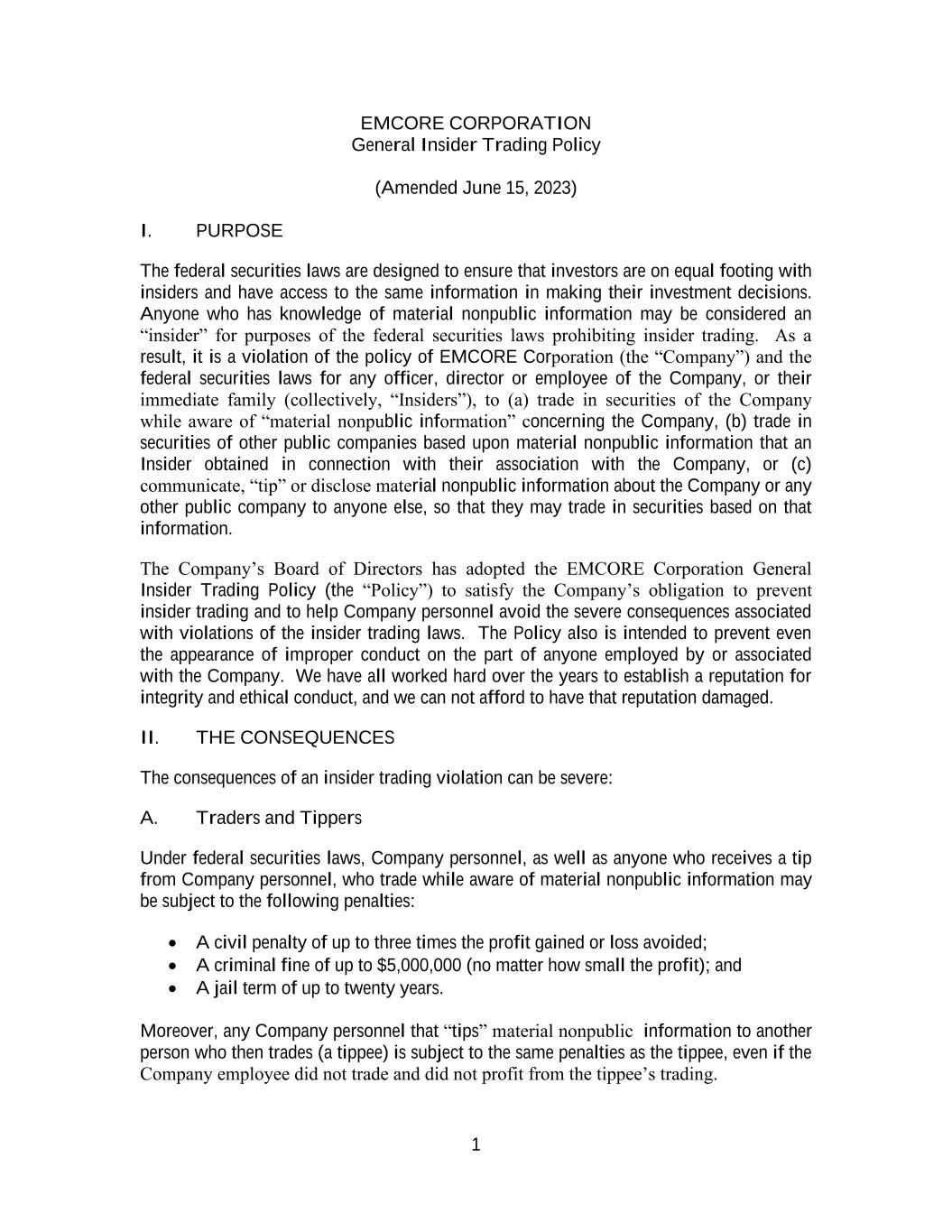
1 EMCORE CORPORATION General Insider Trading Policy (Amended June 15, 2023) I. PURPOSE The federal securities laws are designed to ensure that investors are on equal footing with insiders and have access to the same information in making their investment decisions. Anyone who has knowledge of material nonpublic information may be considered an “insider” for purposes of the federal securities laws prohibiting insider trading. As a result, it is a violation of the policy of EMCORE Corporation (the “Company”) and the federal securities laws for any officer, director or employee of the Company, or their immediate family (collectively, “Insiders”), to (a) trade in securities of the Company while aware of “material nonpublic information” concerning the Company, (b) trade in securities of other public companies based upon material nonpublic information that an Insider obtained in connection with their association with the Company, or (c) communicate, “tip” or disclose material nonpublic information about the Company or any other public company to anyone else, so that they may trade in securities based on that information. The Company’s Board of Directors has adopted the EMCORE Corporation General Insider Trading Policy (the “Policy”) to satisfy the Company’s obligation to prevent insider trading and to help Company personnel avoid the severe consequences associated with violations of the insider trading laws. The Policy also is intended to prevent even the appearance of improper conduct on the part of anyone employed by or associated with the Company. We have all worked hard over the years to establish a reputation for integrity and ethical conduct, and we can not afford to have that reputation damaged. II. THE CONSEQUENCES The consequences of an insider trading violation can be severe: A. Traders and Tippers Under federal securities laws, Company personnel, as well as anyone who receives a tip from Company personnel, who trade while aware of material nonpublic information may be subject to the following penalties: • A civil penalty of up to three times the profit gained or loss avoided; • A criminal fine of up to $5,000,000 (no matter how small the profit); and • A jail term of up to twenty years. Moreover, any Company personnel that “tips” material nonpublic information to another person who then trades (a tippee) is subject to the same penalties as the tippee, even if the Company employee did not trade and did not profit from the tippee’s trading.
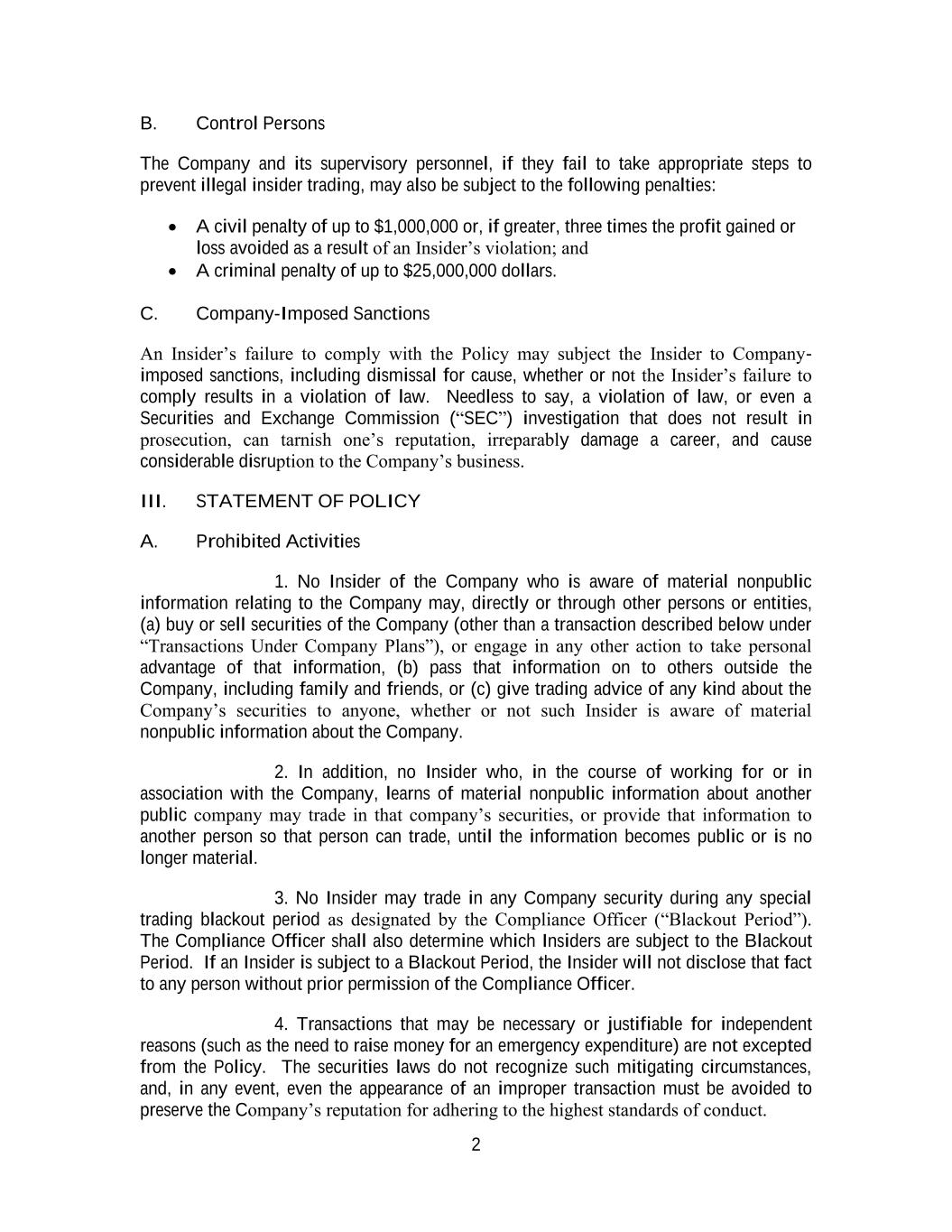
2 B. Control Persons The Company and its supervisory personnel, if they fail to take appropriate steps to prevent illegal insider trading, may also be subject to the following penalties: • A civil penalty of up to $1,000,000 or, if greater, three times the profit gained or loss avoided as a result of an Insider’s violation; and • A criminal penalty of up to $25,000,000 dollars. C. Company-Imposed Sanctions An Insider’s failure to comply with the Policy may subject the Insider to Company- imposed sanctions, including dismissal for cause, whether or not the Insider’s failure to comply results in a violation of law. Needless to say, a violation of law, or even a Securities and Exchange Commission (“SEC”) investigation that does not result in prosecution, can tarnish one’s reputation, irreparably damage a career, and cause considerable disruption to the Company’s business. III. STATEMENT OF POLICY A. Prohibited Activities 1. No Insider of the Company who is aware of material nonpublic information relating to the Company may, directly or through other persons or entities, (a) buy or sell securities of the Company (other than a transaction described below under “Transactions Under Company Plans”), or engage in any other action to take personal advantage of that information, (b) pass that information on to others outside the Company, including family and friends, or (c) give trading advice of any kind about the Company’s securities to anyone, whether or not such Insider is aware of material nonpublic information about the Company. 2. In addition, no Insider who, in the course of working for or in association with the Company, learns of material nonpublic information about another public company may trade in that company’s securities, or provide that information to another person so that person can trade, until the information becomes public or is no longer material. 3. No Insider may trade in any Company security during any special trading blackout period as designated by the Compliance Officer (“Blackout Period”). The Compliance Officer shall also determine which Insiders are subject to the Blackout Period. If an Insider is subject to a Blackout Period, the Insider will not disclose that fact to any person without prior permission of the Compliance Officer. 4. Transactions that may be necessary or justifiable for independent reasons (such as the need to raise money for an emergency expenditure) are not excepted from the Policy. The securities laws do not recognize such mitigating circumstances, and, in any event, even the appearance of an improper transaction must be avoided to preserve the Company’s reputation for adhering to the highest standards of conduct.
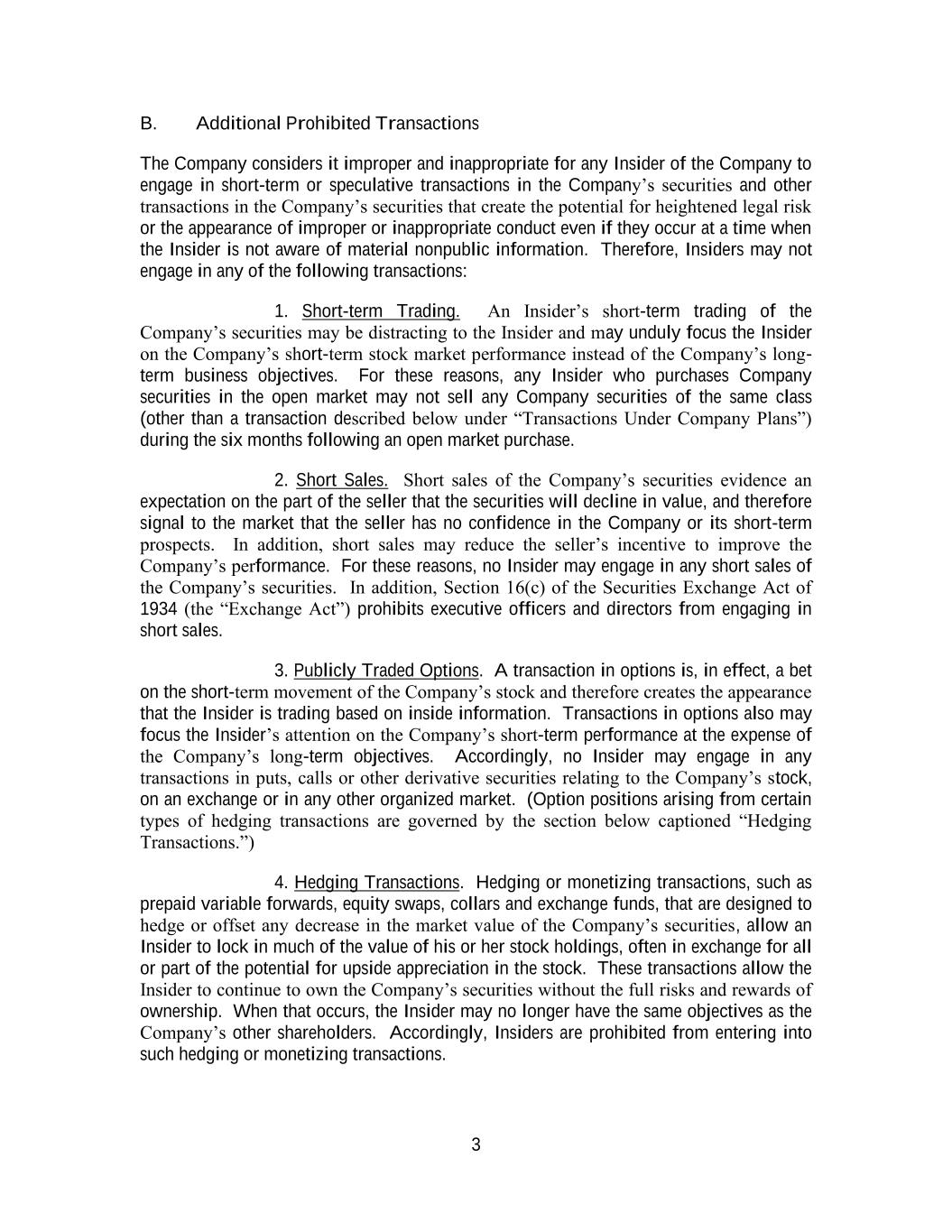
3 B. Additional Prohibited Transactions The Company considers it improper and inappropriate for any Insider of the Company to engage in short-term or speculative transactions in the Company’s securities and other transactions in the Company’s securities that create the potential for heightened legal risk or the appearance of improper or inappropriate conduct even if they occur at a time when the Insider is not aware of material nonpublic information. Therefore, Insiders may not engage in any of the following transactions: 1. Short-term Trading. An Insider’s short-term trading of the Company’s securities may be distracting to the Insider and may unduly focus the Insider on the Company’s short-term stock market performance instead of the Company’s long- term business objectives. For these reasons, any Insider who purchases Company securities in the open market may not sell any Company securities of the same class (other than a transaction described below under “Transactions Under Company Plans”) during the six months following an open market purchase. 2. Short Sales. Short sales of the Company’s securities evidence an expectation on the part of the seller that the securities will decline in value, and therefore signal to the market that the seller has no confidence in the Company or its short-term prospects. In addition, short sales may reduce the seller’s incentive to improve the Company’s performance. For these reasons, no Insider may engage in any short sales of the Company’s securities. In addition, Section 16(c) of the Securities Exchange Act of 1934 (the “Exchange Act”) prohibits executive officers and directors from engaging in short sales. 3. Publicly Traded Options. A transaction in options is, in effect, a bet on the short-term movement of the Company’s stock and therefore creates the appearance that the Insider is trading based on inside information. Transactions in options also may focus the Insider’s attention on the Company’s short-term performance at the expense of the Company’s long-term objectives. Accordingly, no Insider may engage in any transactions in puts, calls or other derivative securities relating to the Company’s stock, on an exchange or in any other organized market. (Option positions arising from certain types of hedging transactions are governed by the section below captioned “Hedging Transactions.”) 4. Hedging Transactions. Hedging or monetizing transactions, such as prepaid variable forwards, equity swaps, collars and exchange funds, that are designed to hedge or offset any decrease in the market value of the Company’s securities, allow an Insider to lock in much of the value of his or her stock holdings, often in exchange for all or part of the potential for upside appreciation in the stock. These transactions allow the Insider to continue to own the Company’s securities without the full risks and rewards of ownership. When that occurs, the Insider may no longer have the same objectives as the Company’s other shareholders. Accordingly, Insiders are prohibited from entering into such hedging or monetizing transactions.
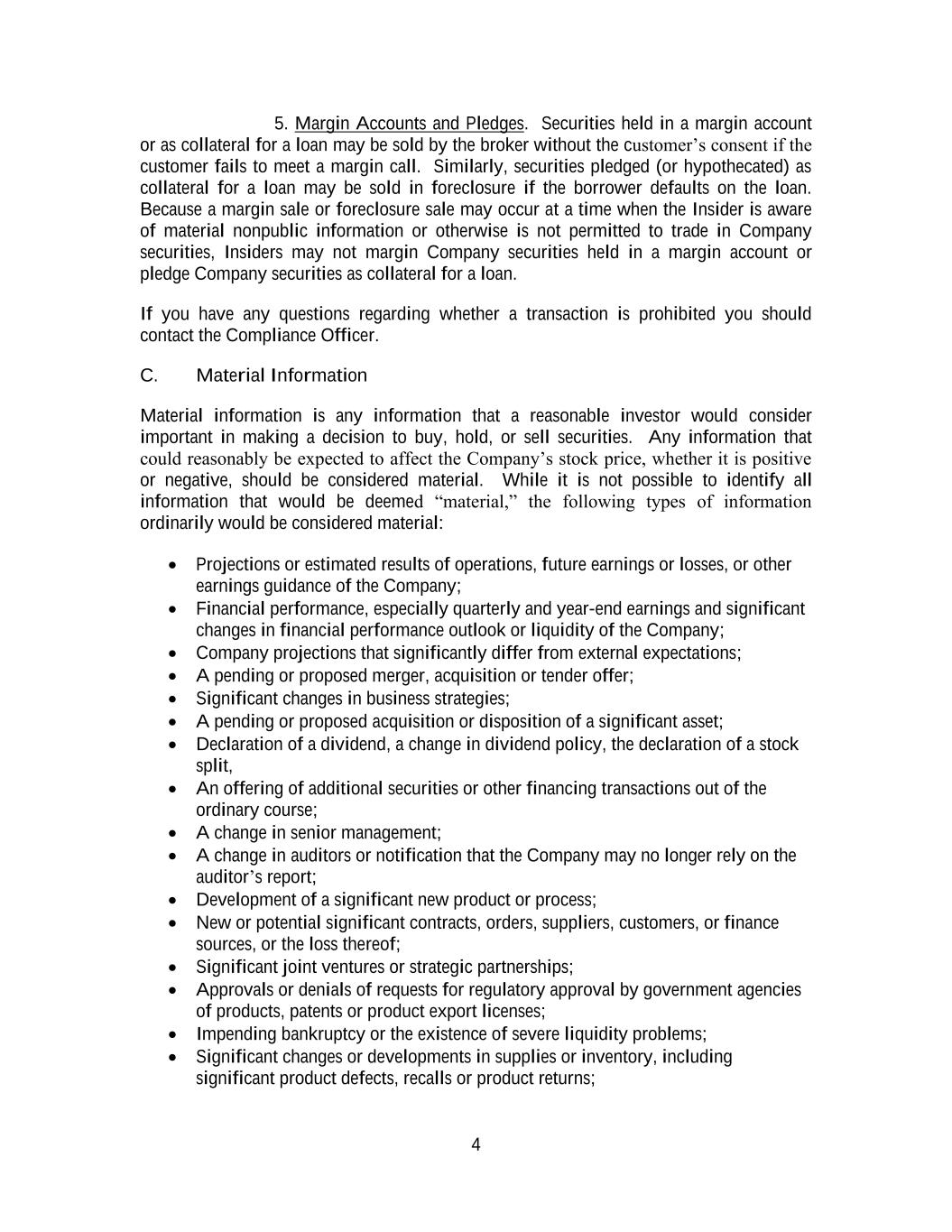
4 5. Margin Accounts and Pledges. Securities held in a margin account or as collateral for a loan may be sold by the broker without the customer’s consent if the customer fails to meet a margin call. Similarly, securities pledged (or hypothecated) as collateral for a loan may be sold in foreclosure if the borrower defaults on the loan. Because a margin sale or foreclosure sale may occur at a time when the Insider is aware of material nonpublic information or otherwise is not permitted to trade in Company securities, Insiders may not margin Company securities held in a margin account or pledge Company securities as collateral for a loan. If you have any questions regarding whether a transaction is prohibited you should contact the Compliance Officer. C. Material Information Material information is any information that a reasonable investor would consider important in making a decision to buy, hold, or sell securities. Any information that could reasonably be expected to affect the Company’s stock price, whether it is positive or negative, should be considered material. While it is not possible to identify all information that would be deemed “material,” the following types of information ordinarily would be considered material: • Projections or estimated results of operations, future earnings or losses, or other earnings guidance of the Company; • Financial performance, especially quarterly and year-end earnings and significant changes in financial performance outlook or liquidity of the Company; • Company projections that significantly differ from external expectations; • A pending or proposed merger, acquisition or tender offer; • Significant changes in business strategies; • A pending or proposed acquisition or disposition of a significant asset; • Declaration of a dividend, a change in dividend policy, the declaration of a stock split, • An offering of additional securities or other financing transactions out of the ordinary course; • A change in senior management; • A change in auditors or notification that the Company may no longer rely on the auditor’s report; • Development of a significant new product or process; • New or potential significant contracts, orders, suppliers, customers, or finance sources, or the loss thereof; • Significant joint ventures or strategic partnerships; • Approvals or denials of requests for regulatory approval by government agencies of products, patents or product export licenses; • Impending bankruptcy or the existence of severe liquidity problems; • Significant changes or developments in supplies or inventory, including significant product defects, recalls or product returns;
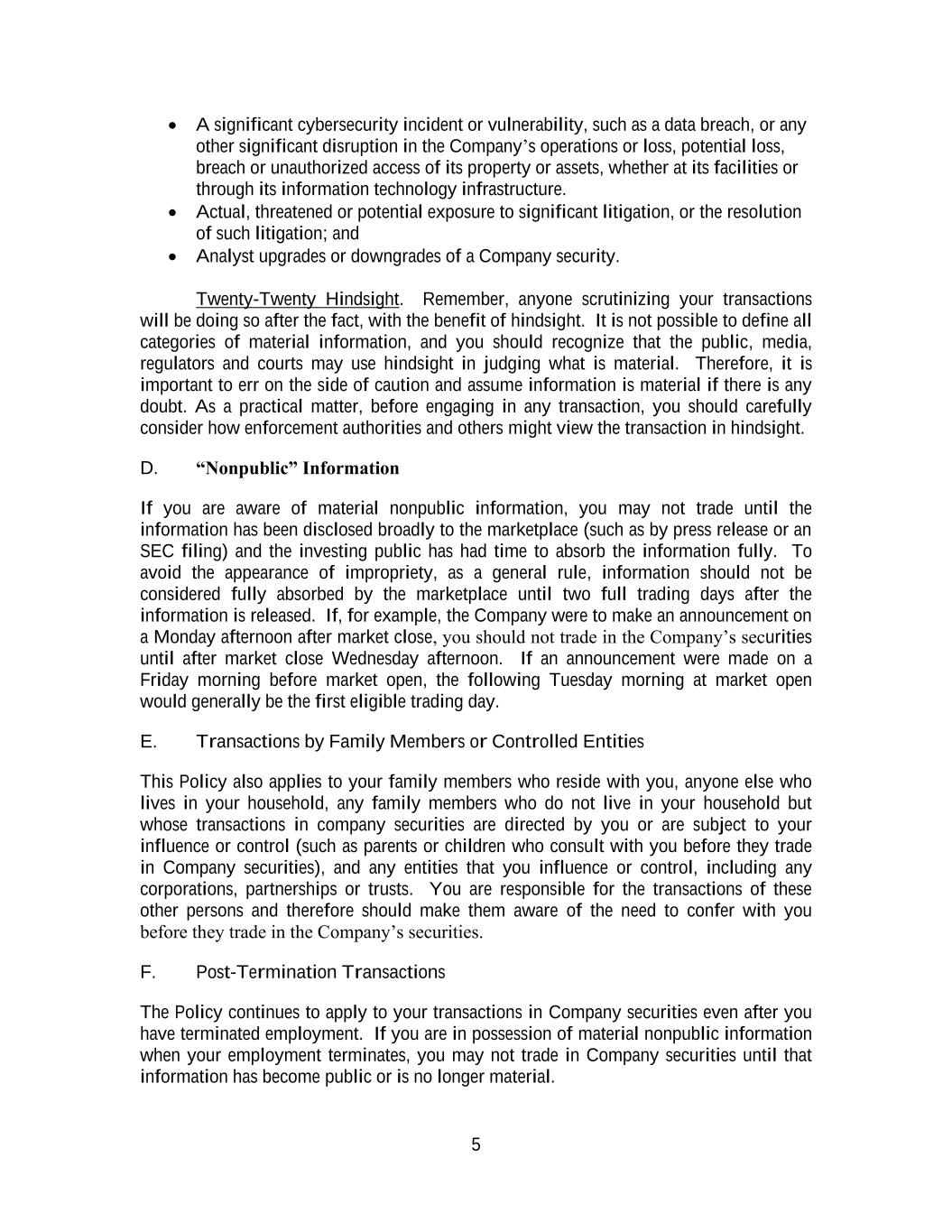
5 • A significant cybersecurity incident or vulnerability, such as a data breach, or any other significant disruption in the Company’s operations or loss, potential loss, breach or unauthorized access of its property or assets, whether at its facilities or through its information technology infrastructure. • Actual, threatened or potential exposure to significant litigation, or the resolution of such litigation; and • Analyst upgrades or downgrades of a Company security. Twenty-Twenty Hindsight. Remember, anyone scrutinizing your transactions will be doing so after the fact, with the benefit of hindsight. It is not possible to define all categories of material information, and you should recognize that the public, media, regulators and courts may use hindsight in judging what is material. Therefore, it is important to err on the side of caution and assume information is material if there is any doubt. As a practical matter, before engaging in any transaction, you should carefully consider how enforcement authorities and others might view the transaction in hindsight. D. “Nonpublic” Information If you are aware of material nonpublic information, you may not trade until the information has been disclosed broadly to the marketplace (such as by press release or an SEC filing) and the investing public has had time to absorb the information fully. To avoid the appearance of impropriety, as a general rule, information should not be considered fully absorbed by the marketplace until two full trading days after the information is released. If, for example, the Company were to make an announcement on a Monday afternoon after market close, you should not trade in the Company’s securities until after market close Wednesday afternoon. If an announcement were made on a Friday morning before market open, the following Tuesday morning at market open would generally be the first eligible trading day. E. Transactions by Family Members or Controlled Entities This Policy also applies to your family members who reside with you, anyone else who lives in your household, any family members who do not live in your household but whose transactions in company securities are directed by you or are subject to your influence or control (such as parents or children who consult with you before they trade in Company securities), and any entities that you influence or control, including any corporations, partnerships or trusts. You are responsible for the transactions of these other persons and therefore should make them aware of the need to confer with you before they trade in the Company’s securities. F. Post-Termination Transactions The Policy continues to apply to your transactions in Company securities even after you have terminated employment. If you are in possession of material nonpublic information when your employment terminates, you may not trade in Company securities until that information has become public or is no longer material.
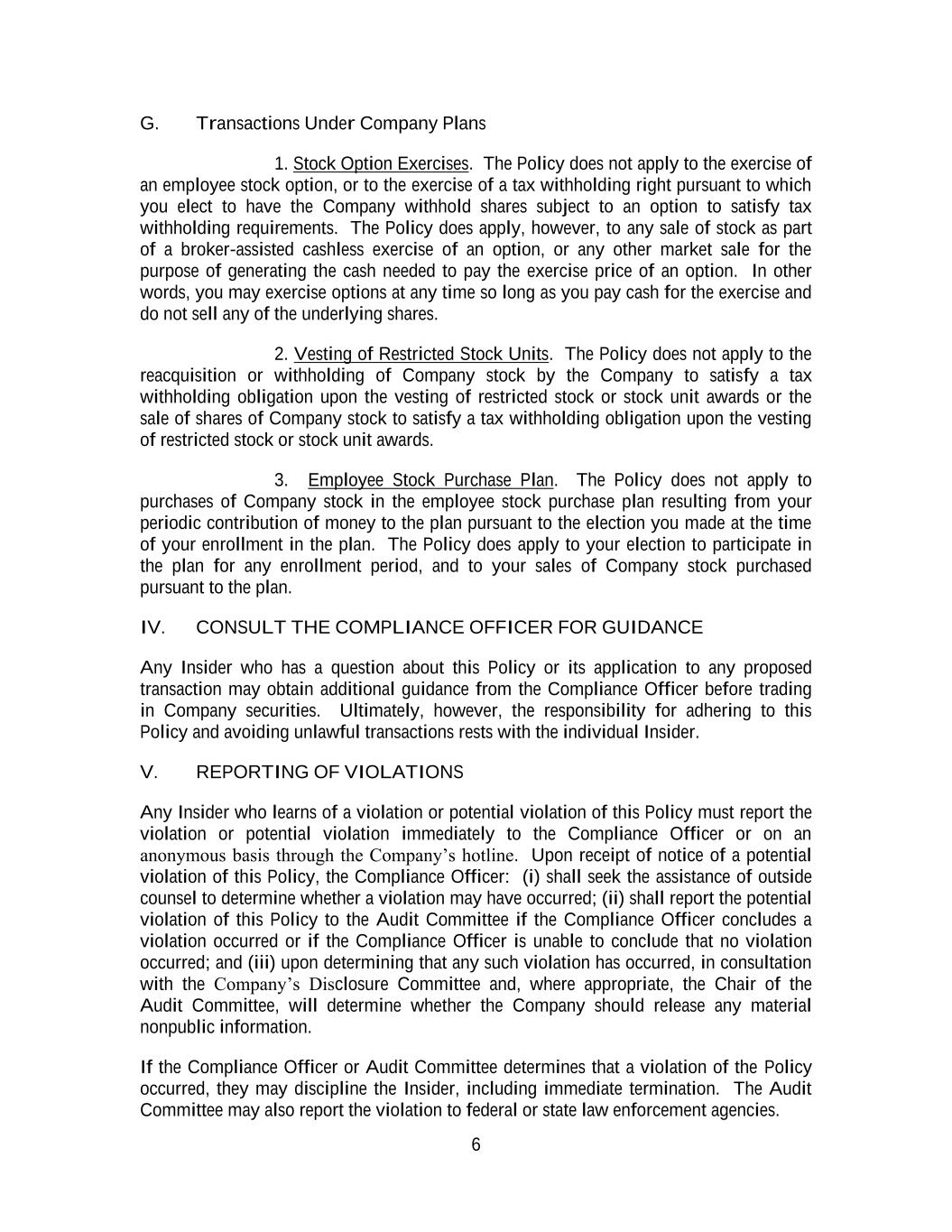
6 G. Transactions Under Company Plans 1. Stock Option Exercises. The Policy does not apply to the exercise of an employee stock option, or to the exercise of a tax withholding right pursuant to which you elect to have the Company withhold shares subject to an option to satisfy tax withholding requirements. The Policy does apply, however, to any sale of stock as part of a broker-assisted cashless exercise of an option, or any other market sale for the purpose of generating the cash needed to pay the exercise price of an option. In other words, you may exercise options at any time so long as you pay cash for the exercise and do not sell any of the underlying shares. 2. Vesting of Restricted Stock Units. The Policy does not apply to the reacquisition or withholding of Company stock by the Company to satisfy a tax withholding obligation upon the vesting of restricted stock or stock unit awards or the sale of shares of Company stock to satisfy a tax withholding obligation upon the vesting of restricted stock or stock unit awards. 3. Employee Stock Purchase Plan. The Policy does not apply to purchases of Company stock in the employee stock purchase plan resulting from your periodic contribution of money to the plan pursuant to the election you made at the time of your enrollment in the plan. The Policy does apply to your election to participate in the plan for any enrollment period, and to your sales of Company stock purchased pursuant to the plan. IV. CONSULT THE COMPLIANCE OFFICER FOR GUIDANCE Any Insider who has a question about this Policy or its application to any proposed transaction may obtain additional guidance from the Compliance Officer before trading in Company securities. Ultimately, however, the responsibility for adhering to this Policy and avoiding unlawful transactions rests with the individual Insider. V. REPORTING OF VIOLATIONS Any Insider who learns of a violation or potential violation of this Policy must report the violation or potential violation immediately to the Compliance Officer or on an anonymous basis through the Company’s hotline. Upon receipt of notice of a potential violation of this Policy, the Compliance Officer: (i) shall seek the assistance of outside counsel to determine whether a violation may have occurred; (ii) shall report the potential violation of this Policy to the Audit Committee if the Compliance Officer concludes a violation occurred or if the Compliance Officer is unable to conclude that no violation occurred; and (iii) upon determining that any such violation has occurred, in consultation with the Company’s Disclosure Committee and, where appropriate, the Chair of the Audit Committee, will determine whether the Company should release any material nonpublic information. If the Compliance Officer or Audit Committee determines that a violation of the Policy occurred, they may discipline the Insider, including immediate termination. The Audit Committee may also report the violation to federal or state law enforcement agencies.
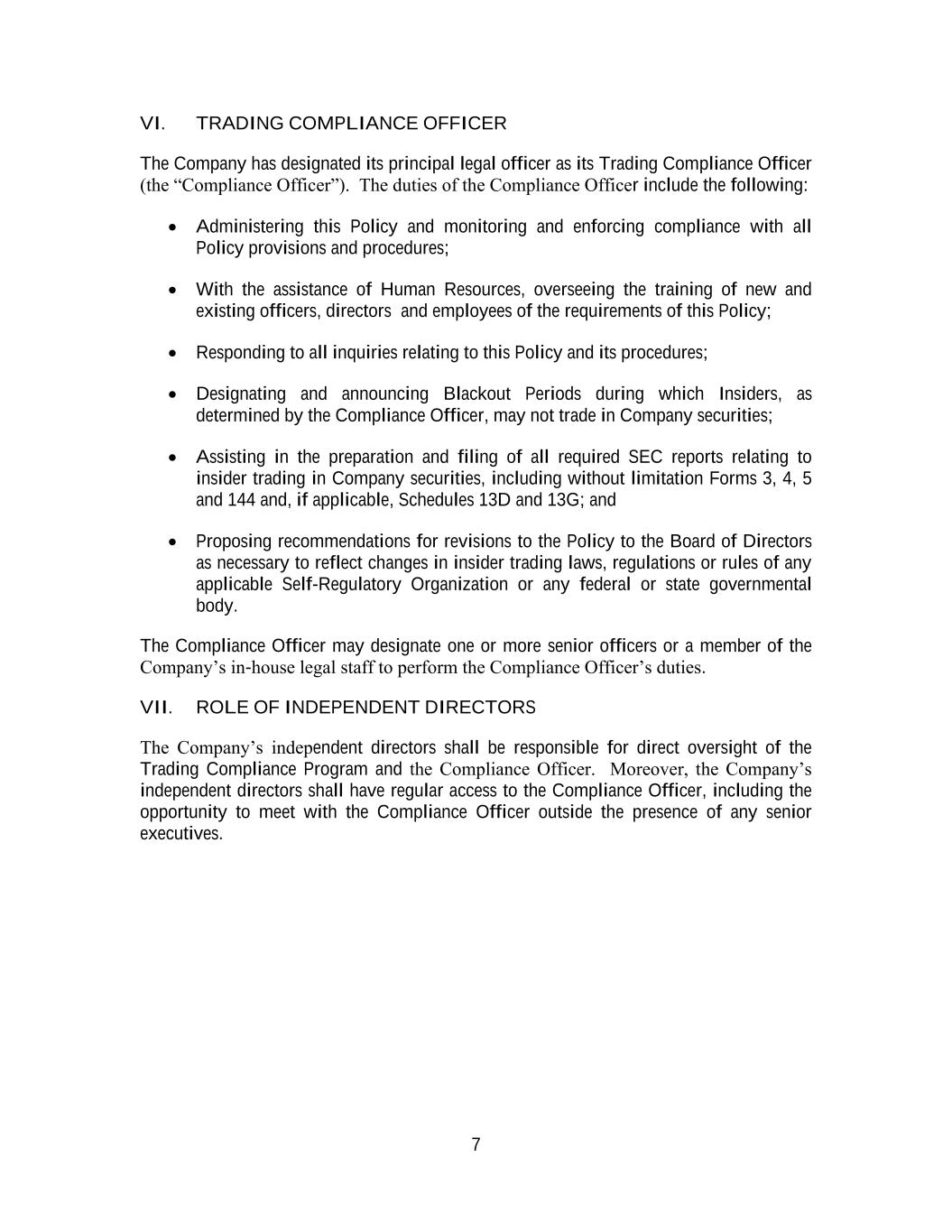
7 VI. TRADING COMPLIANCE OFFICER The Company has designated its principal legal officer as its Trading Compliance Officer (the “Compliance Officer”). The duties of the Compliance Officer include the following: • Administering this Policy and monitoring and enforcing compliance with all Policy provisions and procedures; • With the assistance of Human Resources, overseeing the training of new and existing officers, directors and employees of the requirements of this Policy; • Responding to all inquiries relating to this Policy and its procedures; • Designating and announcing Blackout Periods during which Insiders, as determined by the Compliance Officer, may not trade in Company securities; • Assisting in the preparation and filing of all required SEC reports relating to insider trading in Company securities, including without limitation Forms 3, 4, 5 and 144 and, if applicable, Schedules 13D and 13G; and • Proposing recommendations for revisions to the Policy to the Board of Directors as necessary to reflect changes in insider trading laws, regulations or rules of any applicable Self-Regulatory Organization or any federal or state governmental body. The Compliance Officer may designate one or more senior officers or a member of the Company’s in-house legal staff to perform the Compliance Officer’s duties. VII. ROLE OF INDEPENDENT DIRECTORS The Company’s independent directors shall be responsible for direct oversight of the Trading Compliance Program and the Compliance Officer. Moreover, the Company’s independent directors shall have regular access to the Compliance Officer, including the opportunity to meet with the Compliance Officer outside the presence of any senior executives.